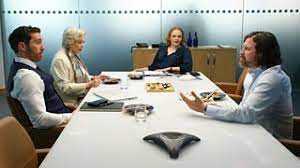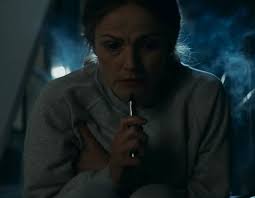"He was ambushed by a cake" - Conor Burns, Conservative MP for Bournemouth West
Ambushed (or, indeed, ambuscaded as Jacob Rees-Mogg unhelpfully explained on Newsnight) by a cake! Have you ever heard such bollocks? The suggestion appears to be that the cake itself was responsible. As if it had its own free will and there was no human intervention whatsoever. Not least by the person who it was presented to, the person whose birthday it was, the person whose office/home the event took place in, and the person who set the rules strictly insisting there could be no social gatherings, let alone parties, whatsoever during lockdown.
Johnson loyalists, like Rees Mogg and Nadine Dorries who both know full well that should he go their cabinet careers are over, continue to try and con the public into thinking this is all some insignificant matter and that the cake is the important detail. It's not. It's the breaking of the law, it's the undermining of a vital public health message during the worst pandemic of our lives, and, more than anything else, it's the continual fucking lying about it.
The roman numerals on these Kakistocracy blogs are now getting too high for my liking - and such is the corruption, dishonesty, and just downright shitbaggery of this government I could easily have written ten times as many. TADS walks aside, this is now the longest series of blogs I have ever written. When Johnson finally fucking goes I will stop this series. That's a promise*
But the thing he is. He's still not gone. He's still, absolutely remarkably and to the eternal shame of both the Tory party and the United Kingdom as a nation, in power. The 'pork pie putsch' of Tory MP for Rutland and Melton Alicia Kearns (named not for Johnson's penchant for porkies but because her constituency includes Melton Mowbray, famed for its pork pies) didn't achieve much and nor did renowned former Brexit secretary David Davis, in the Commons - at PMQs, begging Johnson to "in the name of God, go".
Davis was quoting Leo Amery's demand to Neville Chamberlain step down in 1940, less than a year into World War II. Chamberlain, eventually, had no choice but to go. Even though that must have rankled with the PM, a notorious Churchill fan boy, it seems Johnson is less likely to budge. It's worth bearing in mind, however, that Leo Amery himself had nicked the quote from Oliver Cromwell and we all know how that turned out.
Despite supposedly having written a biography of Churchill, Johnson claimed not to recognise a quote that proved pivotal to Churchill becoming PM. Hmmm. While some like Davis have been fulsome in their condemnation and lickspittles like Rees Mogg and Dorries have backed the crooked liar to the hilt, others have been less equivocal in their support. Chancellor Rishi Sunak, and current favourite to take over from Johnson, simply rose from his chair and walked out of the interview when asked if he supported his boss.
These people are supposed to be his friends. Or whatever passes as friends in a Tory world where every relationship is both transactional and dependent on performance. Nobody thinks Dominic Cummings is Johnson's friend. At least not any more. But it's worth noting the severity of his recent criticism of Johnson who he called a "total fuckwit" who was obsessed with Big Ben's bongs and studying maps to see where he could have monuments built in his honour.
Like some kind of dictator. It's hardly a surprise that Christian Wakeford, the MP for Bury South simply walked out of the Tory party and crossed the floor to join Labour. It seems that Johnson's latest lie on 'partygate', his fourth change of alibi so far - this time he claimed he didn't know the rules (which would make him an even bigger moron that even his harshest critics claim) despite being the person who set them and appearing on television regularly to announce them, was the straw that broke the camel's back for Wakeford.
What took him so long? I don't know much about Wakeford but the fact he backed Boris Johnson in the first place, and sent a WhatsApp message calling the Labour party a "bunch of cunts", suggests he may not be a good fit for the Labour party. I get that to win Labour need to win over Tory voters but Tory MPs? I'm not so sure about that. I imagine many Labour voters and Labour party members can't be happy with this Tory walking into party ahead of them and it reflects badly on Keir Starmer that the man who backed some kind of northern Back Boris campaign can fit so easily into the Labour party less than three years later. I'm glad he walked out on Boris Johnson though. I hope more will.
Perhaps more relevant when considering how low Johnson and his supporters would stoop to hold on to power is that Wakeford spoke about being threatened with blackmail (in the form of smears) if he didn't support Johnson. He's not the only one who's reported such behaviour and it's something I've noticed with liars in the past in my personal life. When they stop getting away with their lies they start to turn quite nasty.
Which Johnson always was (ask Stuart Collier). Although presumably not when celebrating his birthday but you know what it's like when they turn fifty-six. It's so nice to see their little faces light up.
Today Sue Gray finally published her long awaited report into all these parties and some of the highlights include the below lines:-
"Against the backdrop of the pandemic, when the government was asking citizens to accept far-reaching restrictions on their lives, some of the behaviour surrounding these gatherings is difficult to justify"
"At least some of the gatherings in question represent a serious failure to observe not just the high standards expected of those working at the heart of government but also of the standards expected of the entire British population at the time"
"The excessive consumption of alcohol is not appropriate in a professional workplace at any time. Steps must be taken to ensure that every government department has a clear and robust policy in place covering the consumption of alcohol in the workplace"
Will this make any difference to Johnson? Probably not. He's blustered and bullshitted his way out of many tight corners before and he's likely to do so again. How it leaves his reputation within his party and in the country is a different matter and what it does to the standing of the UK globally is truly devastating.
Some of the pages of Gray's report were left blank and this appears to be a result of Cressida Dick and the Metropolitan Police, belatedly - and after saying they had no intention of investigating these crimes, getting involved. Johnson didn't have Dick sacked when she should have been and she's returned the favour by doing her very best to scupper Sue Gray's report. What a crave up. A Dick and a Johnson. No wonder we're all fucked.
When the SNP leader in Westminster, Ian Blackford - having seen Gray's findings, called Johnson a liar he was told to leave parliament by the speaker Lindsay Hoyle which just goes to show that lying is rewarded in British government but telling the truth is punished. The government like to make out that if they weren't distracted by all this talk of parties they'd be able to focus on the upcoming, and long signposted, cost of living crisis and the Russian threat to invade Ukraine but somehow I doubt they'd be focused on these things even if that was the case.
History shows they'd either be too busy partying, too pissed, or too fixated on creating pointless arguments about flags, national anthems, or 'woke' comedians to actually address genuine issues that affect people's lives and livelihoods. Even when they do they have a funny way of doing it. Johnson may have dismissed as 'total rhubarb' the idea that he authorised the airlift of cats and dogs out of Kabul while leaving those who worked for, and with, the UK government at the mercy of the Taliban but does anyone really believe a single word that comes out of Johnson's mouth?
I also doubt they'd have addressed the issue of Islamophobia within the Tory Party which has, yet again, risen its ugly head with Nusrat Ghani, the Tory MP for Wealden in East Sussex, coming forward to say she was dismissed as a transport minister in 2020 because her 'Muslimness' had become an issue with other party members.
It would have been nice if she had done the decent and honourable thing and left the party in disgust and that's true of so many who by remaining in position are tacitly, or actively, backing Johnson and his lies, his corruption, and his sleaze. Good on Tracey Emin for demanding her art is removed from 10 Downing Street, at least until Johnson is replaced.
That provides with a link, an admittedly rather lame one, to round up what I've been up to, personally, since I last wrote one of these. My excuse to prove I don't spend ALL my time raging at this shitshow of a government. I've not been to see any of Emin's work but I did attend exhibitions by Hokusai (British Museum), Frans Hals (the Wallace Collection), Helene Binet (RA), and John Constable (also RA) as well as one, at RIBA, marking the centenary of the foundation of London's largest housing estate, Becontree.
I went to a Skeptics talk on friction (online) and I wandered to the new, and rather splendid, Catford Mews cinema and back to see both Belfast and Nightmare Alley as well as popping out for a few drinks in Dalston with Simon. I've chatted with Mum, Dad, Adam, Vicki, and Ben on the phone and I've bumped into Dewi on the tube and Gareth, with Etienne asleep in his buggy, near the shops at Honor Oak Park. Chris rang me up from beneath the palm trees in Bolivia and twisted my arm as regards heading down to Hastings to see The Swansea Sound in his pub, The Piper.
Which will happen next month and will, hopefully, be a highlight of the month but what would be even better would be to see Boris Johnson removed from power and forced to face criminal proceedings for the criminal acts he has committed and overseen. He's done the wrong thing for so long now, and continually failed upwards, he probably has no idea what the right thing even looks like anymore. The same could be said for his supporters but not for the rest of us. Those of us who agonise over our behaviour and strive to be good people.
So what is the right thing to do now? Well, we all know that. Even Boris Johnson and his supporters do. That is for him, for the first time in his life, to do the decent thing and resign. Where that leaves us as a nation is quite unsure but it won't be as bad as allowing this criminal to stay in position. If it's a simple moral question - which I think it is - the solution is easy. In fact, it's a piece of cake.
*If he's replaced by someone else awful like Gove or Liz Truss I'll probably start another series.




















































